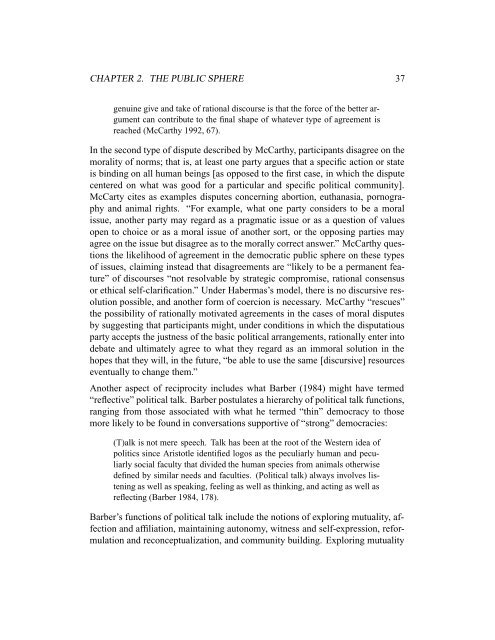Expanding the Public Sphere through Computer ... - ResearchGate
Expanding the Public Sphere through Computer ... - ResearchGate
Expanding the Public Sphere through Computer ... - ResearchGate
You also want an ePaper? Increase the reach of your titles
YUMPU automatically turns print PDFs into web optimized ePapers that Google loves.
CHAPTER 2. THE PUBLIC SPHERE 37<br />
genuine give and take of rational discourse is that <strong>the</strong> force of <strong>the</strong> better argument<br />
can contribute to <strong>the</strong> final shape of whatever type of agreement is<br />
reached (McCarthy 1992, 67).<br />
In <strong>the</strong> second type of dispute described by McCarthy, participants disagree on <strong>the</strong><br />
morality of norms; that is, at least one party argues that a specific action or state<br />
is binding on all human beings [as opposed to <strong>the</strong> first case, in which <strong>the</strong> dispute<br />
centered on what was good for a particular and specific political community].<br />
McCarty cites as examples disputes concerning abortion, euthanasia, pornography<br />
and animal rights. “For example, what one party considers to be a moral<br />
issue, ano<strong>the</strong>r party may regard as a pragmatic issue or as a question of values<br />
open to choice or as a moral issue of ano<strong>the</strong>r sort, or <strong>the</strong> opposing parties may<br />
agree on <strong>the</strong> issue but disagree as to <strong>the</strong> morally correct answer.” McCarthy questions<br />
<strong>the</strong> likelihood of agreement in <strong>the</strong> democratic public sphere on <strong>the</strong>se types<br />
of issues, claiming instead that disagreements are “likely to be a permanent feature”<br />
of discourses “not resolvable by strategic compromise, rational consensus<br />
or ethical self-clarification.” Under Habermas’s model, <strong>the</strong>re is no discursive resolution<br />
possible, and ano<strong>the</strong>r form of coercion is necessary. McCarthy “rescues”<br />
<strong>the</strong> possibility of rationally motivated agreements in <strong>the</strong> cases of moral disputes<br />
by suggesting that participants might, under conditions in which <strong>the</strong> disputatious<br />
party accepts <strong>the</strong> justness of <strong>the</strong> basic political arrangements, rationally enter into<br />
debate and ultimately agree to what <strong>the</strong>y regard as an immoral solution in <strong>the</strong><br />
hopes that <strong>the</strong>y will, in <strong>the</strong> future, “be able to use <strong>the</strong> same [discursive] resources<br />
eventually to change <strong>the</strong>m.”<br />
Ano<strong>the</strong>r aspect of reciprocity includes what Barber (1984) might have termed<br />
“reflective” political talk. Barber postulates a hierarchy of political talk functions,<br />
ranging from those associated with what he termed “thin” democracy to those<br />
more likely to be found in conversations supportive of “strong” democracies:<br />
(T)alk is not mere speech. Talk has been at <strong>the</strong> root of <strong>the</strong> Western idea of<br />
politics since Aristotle identified logos as <strong>the</strong> peculiarly human and peculiarly<br />
social faculty that divided <strong>the</strong> human species from animals o<strong>the</strong>rwise<br />
defined by similar needs and faculties. (Political talk) always involves listening<br />
as well as speaking, feeling as well as thinking, and acting as well as<br />
reflecting (Barber 1984, 178).<br />
Barber’s functions of political talk include <strong>the</strong> notions of exploring mutuality, affection<br />
and affiliation, maintaining autonomy, witness and self-expression, reformulation<br />
and reconceptualization, and community building. Exploring mutuality
















